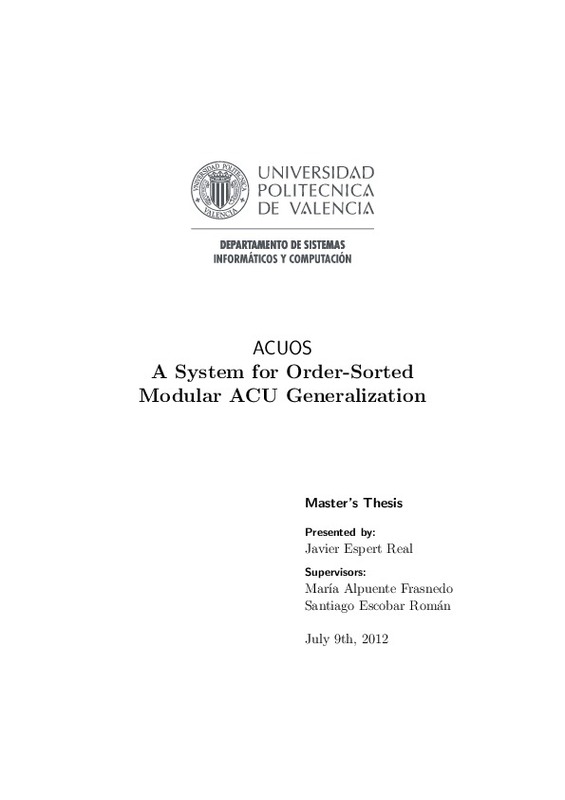JavaScript is disabled for your browser. Some features of this site may not work without it.
Buscar en RiuNet
Listar
Mi cuenta
Estadísticas
Ayuda RiuNet
Admin. UPV
ACUOS: A System for Order-Sorted Modular ACU Generalization
Mostrar el registro sencillo del ítem
Ficheros en el ítem
| dc.contributor.advisor | Alpuente Frasnedo, María
|
es_ES |
| dc.contributor.author | Espert Real, Javier
|
es_ES |
| dc.date.accessioned | 2013-02-06T13:54:18Z | |
| dc.date.available | 2013-02-06T13:54:18Z | |
| dc.date.created | 2012-07-09 | |
| dc.date.issued | 2013-02-06 | |
| dc.identifier.uri | http://hdl.handle.net/10251/19218 | |
| dc.description.abstract | [ES] La generalización, también denominada anti-unificación, es la operación dual de la unificación. Dados dos términos t y t' , un generalizador es un término t'' del cual t y t' son instancias de sustitución. El concepto dual del unificador más general (mgu) es el de generalizador menos general (lgg). En esta tesina extendemos el conocido algoritmo de generalización sin tipos a, primero, una configuración order-sorted con sorts, subsorts y polimorfismo de subtipado; en segundo lugar, la extendemos para soportar generalización módulo teorías ecuacionales, donde los símbolos de función pueden obedecer cualquier combinación de axiomas de asociatividad, conmutatividad e identidad (incluyendo el conjunto vacío de dichos axiomas); y, en tercer lugar, a la combinación de ambos, que resulta en un algoritmo modular de generalización order-sorted ecuacional. A diferencia de las configuraciones sin tipos, en nuestro marco teórico en general el lgg no es único, lo que se debe tanto al tipado como a los axiomas ecuacionales. En su lugar, existe un conjunto finito y mínimo de lggs, tales que cualquier otra generalización tiene a alguno de ellos como instancia. Nuestros algoritmos de generalización se expresan mediante reglas de inferencia para las cuales damos demostraciones de corrección. Ello abre la puerta a nuevas aplicaciones en campos como la evaluación parcial, la síntesis de programas, la minería de datos y la demostración de teoremas para sistemas de razonamiento ecuacional y lenguajes tipados basados en reglas tales como ASD+SDF, Elan, OBJ, CafeOBJ y Maude. Esta tesis también describe una herramienta para el cómputo automatizado de los generalizadores de un conjunto dado de estructuras en un lenguaje tipado módulo un conjunto de axiomas dado. Al soportar la combinación modular de atributos ecuacionales de asociatividad, conmutatividad y existencia de elemento neutro (ACU) para símbolos de función arbitrarios, la generalización ACU modular aporta suficiente poder expresivo a la generalización ordinaria para razonar sobre estructuras de datos tipadas tales como listas, conjuntos y multiconjuntos. La técnica ha sido implementada con generalidad y eficiencia en el sistema ACUOS y puede ser fácilmente integrada con software de terceros. | es_ES |
| dc.description.abstract | [EN] Generalization, also called anti-uni cation, is the dual of uni cation. Given terms t and t 0 , a generalization is a term t 00 of which t and t 0 are substitution instances. The dual of a most general uni er (mgu) is that of least general generalization (lgg). In this thesis, we extend the known untyped generalization algorithm to, rst, an order-sorted typed setting with sorts, subsorts, and subtype polymorphism; second, we extend it to work modulo equational theories, where function symbols can obey any combination of associativity, commutativity, and identity axioms (includ- ing the empty set of such axioms); and third, to the combination of both, which results in a modular, order-sorted equational generalization algo- rithm. Unlike the untyped case, there is in general no single lgg in our framework, due to order-sortedness or to the equational axioms. Instead, there is a nite, minimal set of lggs, so that any other generalization has at least one of them as an instance. Our generalization algorithms are expressed by means of inference systems for which we give proofs of cor- rectness. This opens up new applications to partial evaluation, program synthesis, data mining, and theorem proving for typed equational rea- soning systems and typed rule-based languages such as ASF+SDF, Elan, OBJ, Cafe-OBJ, and Maude. This thesis also describes a tool for automatically computing the gen- eralizers of a given set of structures in a typed language modulo a set of axioms. By supporting the modular combination of associative, com- mutative and unity (ACU) equational attributes for arbitrary function symbols, modular ACU generalization adds enough expressive power to ordinary generalization to reason about typed data structures such as lists, sets and multisets. The ACU generalization technique has been generally and e ciently implemented in the ACUOS system and can be easily integrated with third-party software. | es_ES |
| dc.format.extent | 102 | es_ES |
| dc.language | Inglés | es_ES |
| dc.publisher | Universitat Politècnica de València | es_ES |
| dc.rights | Reconocimiento - No comercial - Sin obra derivada (by-nc-nd) | es_ES |
| dc.subject | Generalización menos general | es_ES |
| dc.subject | Razonamiento ecuacional | es_ES |
| dc.subject | Least general generalization | es_ES |
| dc.subject | Rule-based languages | es_ES |
| dc.subject | Equational reasoning | es_ES |
| dc.subject | Lenguajes basados en reglas | es_ES |
| dc.subject.classification | LENGUAJES Y SISTEMAS INFORMATICOS | es_ES |
| dc.subject.other | Máster Universitario en Ingeniería del Software, Métodos Formales y Sistemas de Información-Màster Universitari en Enginyeria del Programari, Mètodes Formals i Sistemes D'Informació | es_ES |
| dc.title | ACUOS: A System for Order-Sorted Modular ACU Generalization | es_ES |
| dc.type | Tesis de máster | es_ES |
| dc.rights.accessRights | Abierto | es_ES |
| dc.contributor.affiliation | Universitat Politècnica de València. Servicio de Alumnado - Servei d'Alumnat | es_ES |
| dc.description.bibliographicCitation | Espert Real, J. (2012). ACUOS: A System for Order-Sorted Modular ACU Generalization. http://hdl.handle.net/10251/19218 | es_ES |
| dc.description.accrualMethod | Archivo delegado | es_ES |






